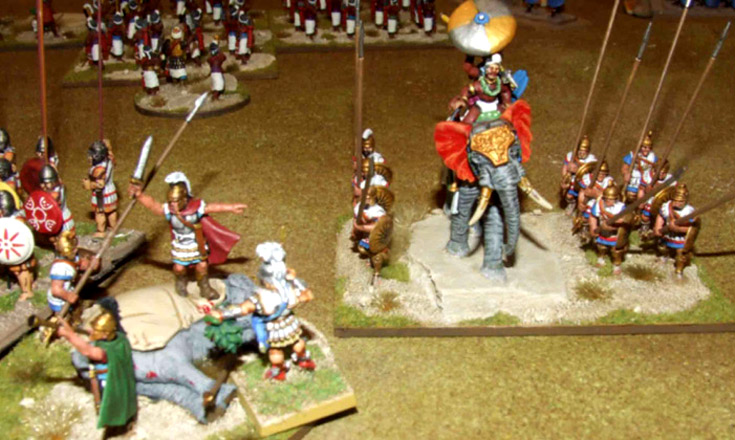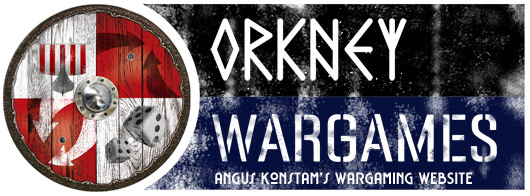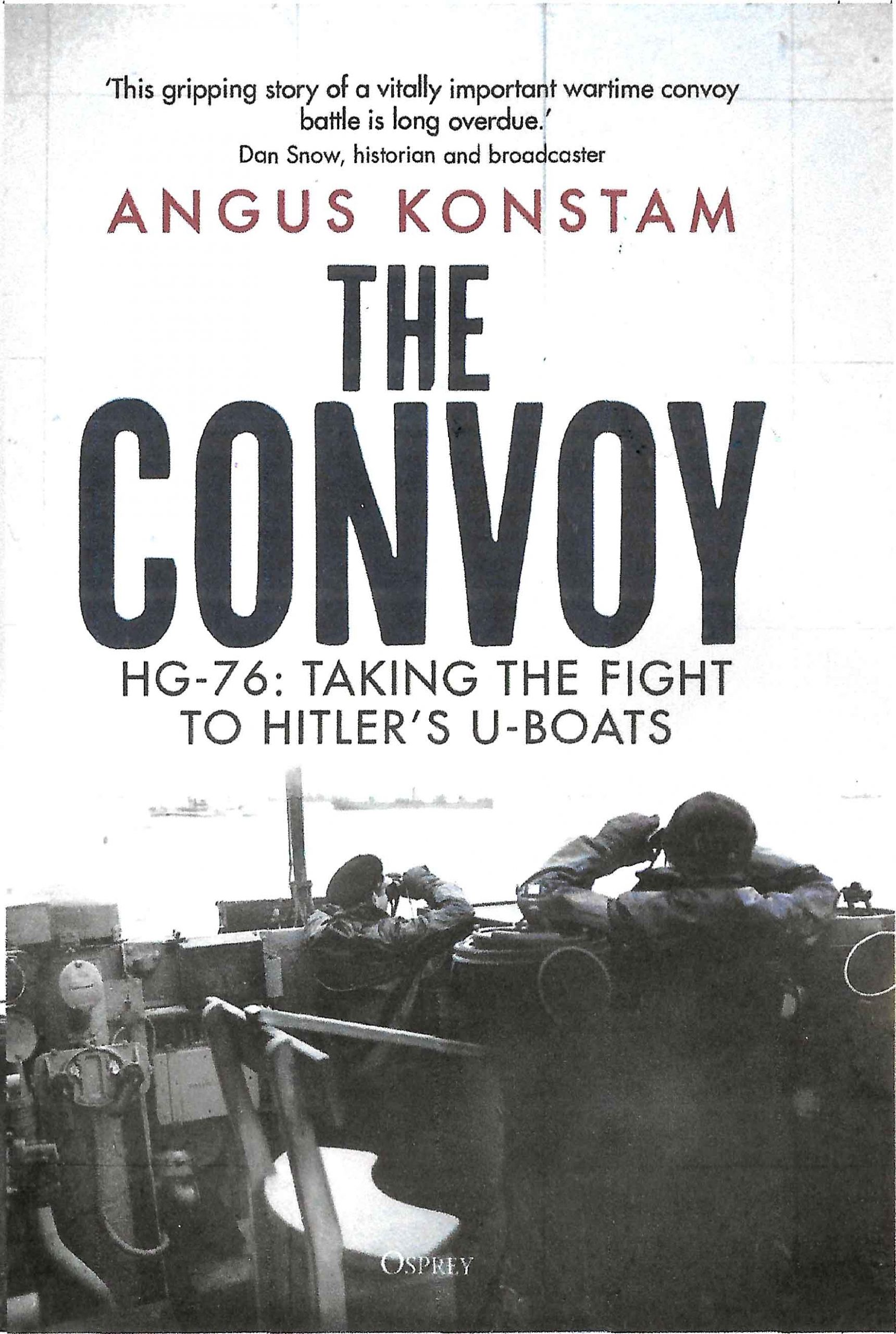
The Relief of Paronakos, 178 BC
3rd March 2013, 0 Comments
The Roman World, Hail Caesar, 28mm
I’ve got to say, I’m not really an Ancients player. However, I found myself talked into taking part in this huge game, and it inspired me to finally paint that Roman army I’ve had languishing in the lead pile for several years. Actually, that’s not strictly true. I swapped it for a pile of Seven Years War French lead, and last year I swapped them back for a handful of books. My figures are Late Republican Roman, and this game was set about half a century earlier, around the late 2nd century BC. I simply used them as Hastati, Principes and Triarii, arguing that one army morphed into the other by the time of the Marian reforms. Anyway, I felt pretty pleased at painting up 120 of the little fellows, until I brought them along on the day, and they only made up a fraction of the entire Roman force on the table! That wasn’t even counting the opposition – a confederation of Successor states, all fighting over a fictitious besieged city in Asia Minor. The game revolved around the siege of Paranakos, where Roman Allies – Greeks of some kind – were besieged by a host of Successor forces, which included Macedonians, Bactirans (complete with a very large Indian contingent), and assorted Persian or vaguely Middle Eastern horse. A Republican Roman army was marching to relieve the city, but to add a little extra excitement three mercenary forces were hovering around the wings. A Galatian force and a Scythian one lingered on the northern end of the long table, while a Thracian one was hovering around the southern edge. Both sides had money to bribe to bribe these neutral mercenaries – the Thracians even changed sides three times, before the Successors finally had enough of their duplicity and sent part of their army over to crush them. Even that wasn’t that easy – the Thracians gave as good as they got, and were still hanging on after a whole weekend of gaming.
The game revolved around the siege of Paranakos, where Roman Allies – Greeks of some kind – were besieged by a host of Successor forces, which included Macedonians, Bactirans (complete with a very large Indian contingent), and assorted Persian or vaguely Middle Eastern horse. A Republican Roman army was marching to relieve the city, but to add a little extra excitement three mercenary forces were hovering around the wings. A Galatian force and a Scythian one lingered on the northern end of the long table, while a Thracian one was hovering around the southern edge. Both sides had money to bribe to bribe these neutral mercenaries – the Thracians even changed sides three times, before the Successors finally had enough of their duplicity and sent part of their army over to crush them. Even that wasn’t that easy – the Thracians gave as good as they got, and were still hanging on after a whole weekend of gaming. The Romans came on to the north of the city, and seemed to take ages to get into position. Of the three Roman commanders two held consular rank – Dave Imrie and Jack Glanville jointly ran Consul Thicus Mincius, while my consul was Cuntius Maximus. My task was to head towards the city to relieve the hard-pressed defenders, while the other two lads held off the Macedonians and Scythians facing them. The Greeks certainly needed help – poor Ian defending the city was beset on all sides. Things rapidly went from bad to worse when a pair of elephants hit his line in the flank, and proceeded to trample over half his army before they could be halted. My Romans did as best as they could – one division headed to intercept the blocking force of Bactrian phalangites, while my other two commands passed behind them to join forces with the defenders of Paranakos.
The Romans came on to the north of the city, and seemed to take ages to get into position. Of the three Roman commanders two held consular rank – Dave Imrie and Jack Glanville jointly ran Consul Thicus Mincius, while my consul was Cuntius Maximus. My task was to head towards the city to relieve the hard-pressed defenders, while the other two lads held off the Macedonians and Scythians facing them. The Greeks certainly needed help – poor Ian defending the city was beset on all sides. Things rapidly went from bad to worse when a pair of elephants hit his line in the flank, and proceeded to trample over half his army before they could be halted. My Romans did as best as they could – one division headed to intercept the blocking force of Bactrian phalangites, while my other two commands passed behind them to join forces with the defenders of Paranakos. Over to the north the Galatians decided to throw in their lot with the Romans – a wise decision given the Roman superiority in numbers, but Chris commanding the tribesmen hadn’t reckoned for the Scythians, who promptly declared for the Successors, and drove his Galatians off the table before the Romans could lift a finger to help. Ken Pierce played the Thracians and the Scythians, and this declaration of alleigance meant that he had one force fighting on one side, and the other one fighting for the other lot. He spent the rest of the weekend shuffling between the two extreme ends of the table, trying to make the most of his rapidly depleting force of mercenaries. Still, all his double-dealing paid off, and he emerged with two battered armies, but sacks filled with gold from both sides!
Over to the north the Galatians decided to throw in their lot with the Romans – a wise decision given the Roman superiority in numbers, but Chris commanding the tribesmen hadn’t reckoned for the Scythians, who promptly declared for the Successors, and drove his Galatians off the table before the Romans could lift a finger to help. Ken Pierce played the Thracians and the Scythians, and this declaration of alleigance meant that he had one force fighting on one side, and the other one fighting for the other lot. He spent the rest of the weekend shuffling between the two extreme ends of the table, trying to make the most of his rapidly depleting force of mercenaries. Still, all his double-dealing paid off, and he emerged with two battered armies, but sacks filled with gold from both sides!  The game was played out over a weekend, from Saturday morning until mid Sunday afternoon, with the evening off for lots of liquid refreshment in between. By the end of Saturday things were reaching a climax. The Greek defenders of Paranakos were on their last legs, but my Romans had arrived to support them, and the division fighting the Bactrian phalangites (that’s them up above on the left) was holding them off with relative ease. The Thracians were on their last legs, but the Skythians had linked up with the serried ranks of Seleucids to face off the bulk of the Roman army. It was all to play for.
The game was played out over a weekend, from Saturday morning until mid Sunday afternoon, with the evening off for lots of liquid refreshment in between. By the end of Saturday things were reaching a climax. The Greek defenders of Paranakos were on their last legs, but my Romans had arrived to support them, and the division fighting the Bactrian phalangites (that’s them up above on the left) was holding them off with relative ease. The Thracians were on their last legs, but the Skythians had linked up with the serried ranks of Seleucids to face off the bulk of the Roman army. It was all to play for. A slightly subdued dozen wargamers resumed the game the next morning, after the previous evening’s roistering, but things soon got cracking, with JP’s Seleucid’s throwing caution to the wind and charging the line of Romans in front of them. Unfortunately the charge stopped an inch short of the Roman line, and in their turn the Romans counter-charged, and chopped the stationary phalangites to pieces. Undismayed JP threw in his reserves, who checked the ROmans, but eventually succumbed to their superior discipline and good die rolling. Over in front of the city the defenders were given new heart by the arrival of my Romans, and formed a stout blocking force which halted any further attempt to roll the Greeks up. Meanwhile my own division saw off the Bactrians, but was then faced with a hordes of Indians coming up behind them, led by a bunch of chariots. John Glass rolled badly for his battle-winning cavalry charge, and as a result they hit the Romans in penny packets. While they caused my Romans some anxious moments they were eventually seen off.
A slightly subdued dozen wargamers resumed the game the next morning, after the previous evening’s roistering, but things soon got cracking, with JP’s Seleucid’s throwing caution to the wind and charging the line of Romans in front of them. Unfortunately the charge stopped an inch short of the Roman line, and in their turn the Romans counter-charged, and chopped the stationary phalangites to pieces. Undismayed JP threw in his reserves, who checked the ROmans, but eventually succumbed to their superior discipline and good die rolling. Over in front of the city the defenders were given new heart by the arrival of my Romans, and formed a stout blocking force which halted any further attempt to roll the Greeks up. Meanwhile my own division saw off the Bactrians, but was then faced with a hordes of Indians coming up behind them, led by a bunch of chariots. John Glass rolled badly for his battle-winning cavalry charge, and as a result they hit the Romans in penny packets. While they caused my Romans some anxious moments they were eventually seen off. By then the main Successor general was fleeing the field, having tried to intervene to prop up his Bactrian phalangites, and soon several Indian units joined in the rout. That’s him in the picture below, standing on a dead elephant, wondering how it all went so wrong. By this stage there was a lot of whining form the Successor players, claiming that the Romans were over-rated in the rules, and that their small maniple-sized units were unfairly “gamey”. Vulpes Acerbae (sour grapes), if my old Latin teacher can forgive my bad grammar. The Romans did well, through a combination of luck, keeping in tight order, and generally acting like Romans. The game was eventually declared a Roman victory. Although the Successors had reached one gate of the city the Romans reached the main gate, and hence relieved Paranakos. We could have fought on for another couple of house, but by then it was pretty clear that the Successors had shot their bolt.
By then the main Successor general was fleeing the field, having tried to intervene to prop up his Bactrian phalangites, and soon several Indian units joined in the rout. That’s him in the picture below, standing on a dead elephant, wondering how it all went so wrong. By this stage there was a lot of whining form the Successor players, claiming that the Romans were over-rated in the rules, and that their small maniple-sized units were unfairly “gamey”. Vulpes Acerbae (sour grapes), if my old Latin teacher can forgive my bad grammar. The Romans did well, through a combination of luck, keeping in tight order, and generally acting like Romans. The game was eventually declared a Roman victory. Although the Successors had reached one gate of the city the Romans reached the main gate, and hence relieved Paranakos. We could have fought on for another couple of house, but by then it was pretty clear that the Successors had shot their bolt. We all had a great weekend, and despite the late-game carping Hail Caesar worked splendidly, and gave a fast-moving and closely-fought game. Afterwards I returned my borrowed velites, and my Romans resumed their late Republican appearance – all ready for their next outing, which might well be a Roman Civil War bash, with Pompey attempting to thwart the ambitions of that upstart Julius Caesar…
We all had a great weekend, and despite the late-game carping Hail Caesar worked splendidly, and gave a fast-moving and closely-fought game. Afterwards I returned my borrowed velites, and my Romans resumed their late Republican appearance – all ready for their next outing, which might well be a Roman Civil War bash, with Pompey attempting to thwart the ambitions of that upstart Julius Caesar…

